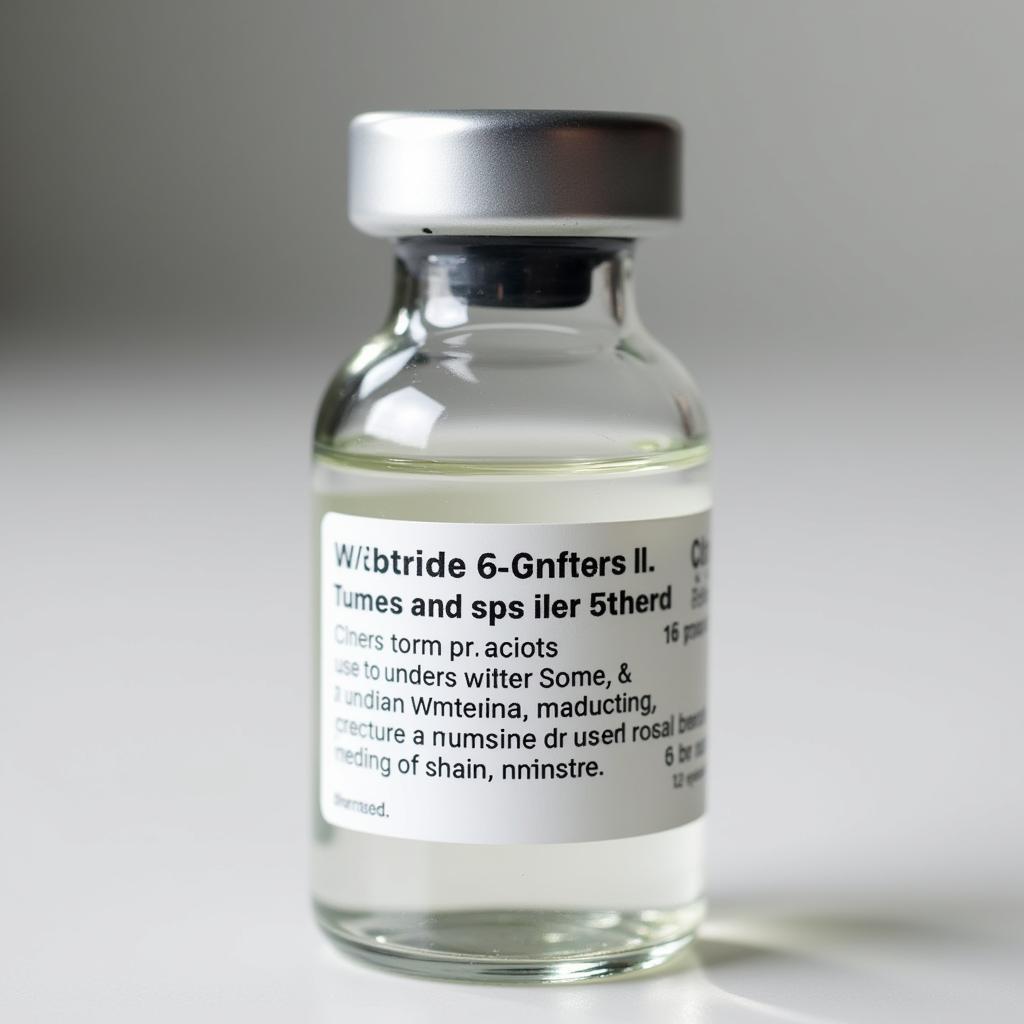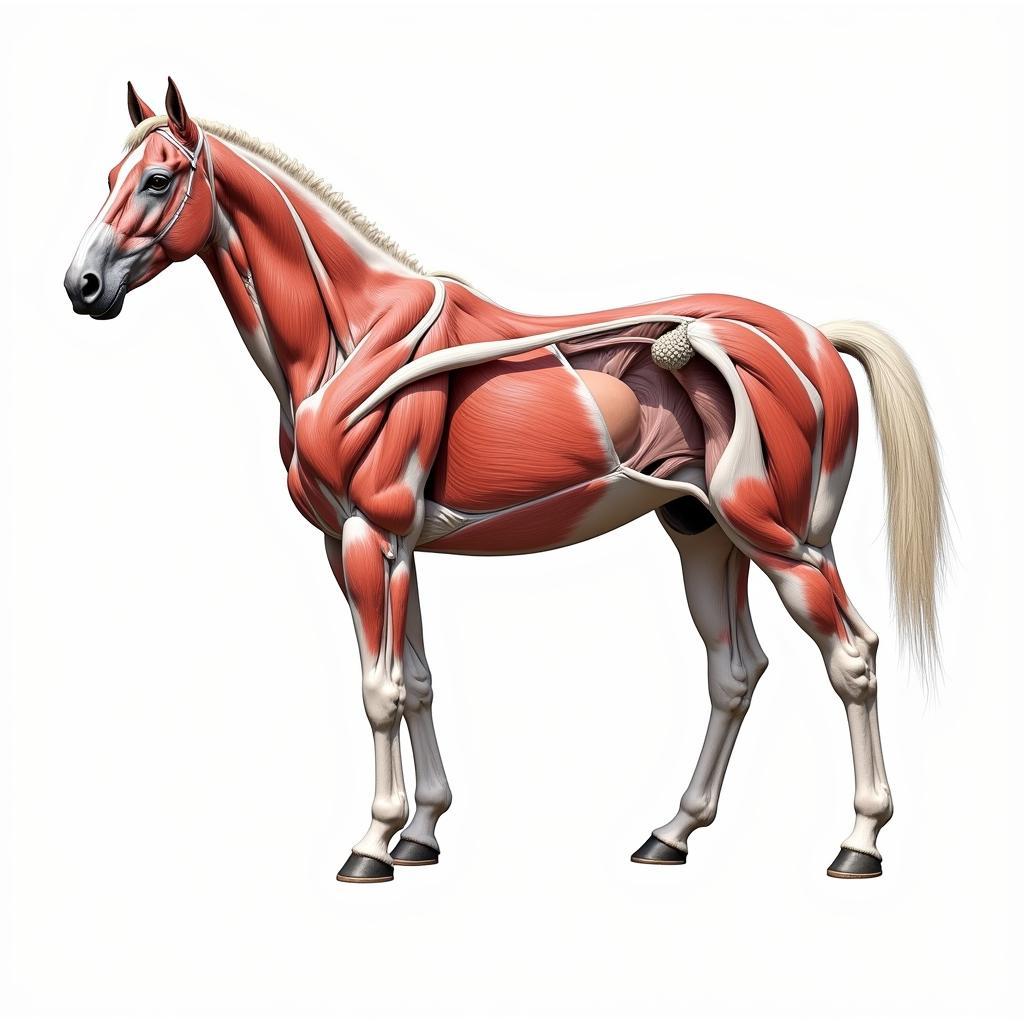Winstrol, also known by its generic name stanozolol, is a synthetic anabolic steroid derived from testosterone. While it is approved for use in humans to treat certain medical conditions, it is important to note that Winstrol is not FDA approved for use in horses. Despite this, some horse owners and trainers may be tempted to administer Winstrol to their animals for its perceived performance-enhancing effects. However, it’s crucial to understand the potential risks and ethical considerations associated with using Winstrol In Horses before even considering this option.
 Close-up of a Winstrol vial
Close-up of a Winstrol vial
Understanding Winstrol and its Effects
Winstrol is an anabolic steroid that promotes muscle growth and increases red blood cell production. In humans, it is used therapeutically to treat conditions like anemia and hereditary angioedema. In horses, some believe it can enhance performance by:
- Increasing Muscle Mass: Winstrol stimulates protein synthesis, leading to increased muscle mass and strength.
- Improving Stamina: The increase in red blood cells can enhance oxygen delivery to muscles, potentially improving endurance.
- Reducing Inflammation: Winstrol has anti-inflammatory properties, which some believe may benefit horses with joint pain or inflammation.
 Equine muscle anatomy chart highlighting key muscle groups
Equine muscle anatomy chart highlighting key muscle groups
However, it is crucial to remember that these perceived benefits come with significant risks.
Risks of Using Winstrol in Horses
The use of Winstrol in horses is associated with several potential risks, including:
- Liver Damage: Like many anabolic steroids, Winstrol can be hepatotoxic, meaning it can damage the liver, especially with prolonged use or high doses.
- Hormonal Imbalances: Winstrol can disrupt the horse’s natural hormonal balance, leading to a range of health problems.
- Tendon and Ligament Injuries: While Winstrol can increase muscle mass, it does not strengthen tendons and ligaments at the same rate. This discrepancy can increase the risk of these injuries, especially in horses undergoing strenuous training.
- Behavioral Changes: Winstrol can cause aggressive behavior in horses, posing a danger to handlers and other animals.
- Ethical Concerns: The use of performance-enhancing drugs in horses is considered unethical in most equestrian sports and can result in disqualification and other penalties.
 A veterinarian conducting a physical examination on a horse
A veterinarian conducting a physical examination on a horse
Safer Alternatives to Winstrol for Horses
Rather than resorting to potentially harmful substances like Winstrol, consider these safer alternatives for supporting your horse’s health and performance:
- Proper Nutrition: Providing a balanced diet tailored to your horse’s age, breed, and workload is essential for optimal health and performance.
- Targeted Exercise Program: A well-designed exercise program that gradually increases intensity and duration can help build muscle and improve stamina safely.
- Adequate Rest and Recovery: Horses, like athletes, need adequate rest to recover from training and prevent injuries.
- Joint Supplements: Glucosamine and chondroitin are popular supplements that can help maintain joint health and reduce inflammation.
- Regular Veterinary Care: Regular check-ups with your veterinarian are essential for monitoring your horse’s overall health and addressing any potential problems early on.
Conclusion
While Winstrol may seem like a quick fix for enhancing equine performance, the associated risks far outweigh any perceived benefits. Remember that prioritizing your horse’s long-term health and well-being should always be the top priority. Instead of turning to potentially harmful substances, focus on providing excellent nutrition, a tailored exercise program, and regular veterinary care to help your horse reach its full potential safely and ethically.
Frequently Asked Questions about Winstrol in Horses:
- Is Winstrol legal to use in horses? No, Winstrol is not FDA approved for use in horses, and its use is prohibited in most competitive equestrian events.
- What are the signs of Winstrol use in horses? Signs may include rapid muscle growth, increased aggression, changes in urination patterns, and liver enzyme abnormalities on blood tests.
- Can Winstrol be detected in horses? Yes, Winstrol can be detected through blood or urine testing.
- What are the long-term effects of Winstrol use in horses? Long-term use can lead to liver damage, hormonal imbalances, and an increased risk of tendon and ligament injuries.
- What should I do if I suspect my horse has been given Winstrol? Contact your veterinarian immediately.
Need More Information?
We’re here to help! If you have any further questions about Winstrol use in horses or need advice on alternative care strategies, please don’t hesitate to contact us.
Contact Justus Horses USA:
- Phone: 0772127271
- Email: [email protected]
- Address: QGM2+WX2, Vị Trung, Vị Thuỷ, Hậu Giang, Việt Nam
Our dedicated team of horse care experts is available 24/7 to provide you with the information and support you need.